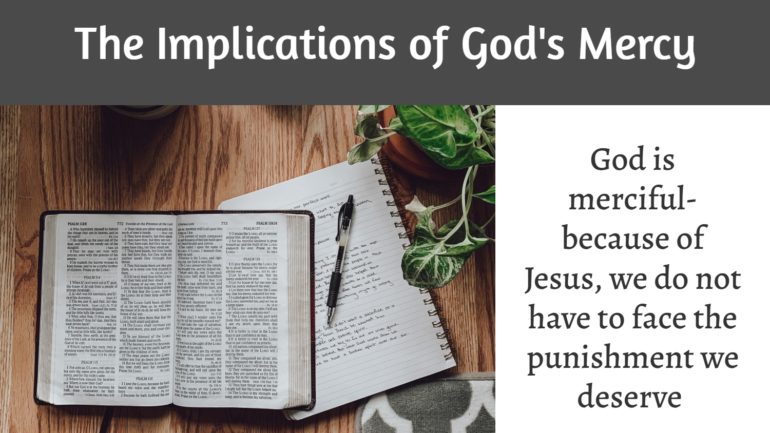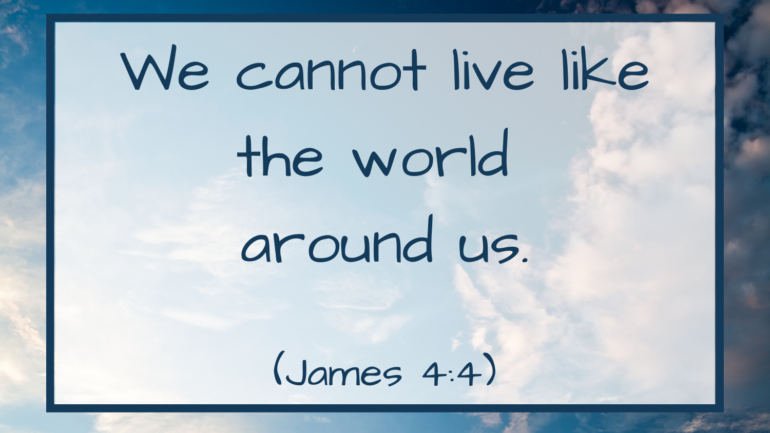Because of God’s mercy and the work of Christ on our behalf, we will not face the punishment that we deserve for our sin.
How does God show mercy?
Mercy is not something that we talk about a lot. On a legal show, you may hear about someone throwing himself on the mercy of the court. A character on a show I watched as a child said “have mercy” almost like a catchphrase. But what is mercy?
General Mercy
In a broad sense, mercy means not getting what you deserve, but there are other aspects to mercy. Mercy involves having compassion for people, and trying to relieve the suffering and misery of others, such as feeding the hungry and clothing the naked, and so on, like when we talk about people doing acts of mercy. God also has compassion for His creation. According to Psalm 145:9, “The Lord is good to all, and his mercy is over all that he has made.” God shows mercy to all of His creation, such as to animals and nature. He takes care of the animals, gives them life and allows them to survive. Arthur Pink, in his book The Attributes of God, describes that as God’s general mercy.
Special Mercy
God also shows mercy specifically to mankind in a way that He doesn’t to animals. Matthew 5:45 says, “He makes his sun rise on the evil and on the good, and sends rain on the just and on the unjust.” The fact that anyone is even alive right now is an act of God’s mercy. Instead of killing everyone immediately for their sin, He allows them to live. He even has compassion on them, giving them all they need to survive. Arthur Pink calls this God’s special mercy, and it’s shown to believers and unbelievers alike. Even unbelievers live and prosper and have good lives. However, this special mercy is for this lifetime only. Unbelievers will receive no mercy beyond the grave.
Sovereign Mercy
There is a third type of mercy that God shows only to His elect, to those who will be saved. This is an eternal mercy. Arthur Pink calls this sovereign mercy, which is the type of mercy we mentioned earlier, where we don’t get what we deserve. We deserved to die because we are sinners. However, Jesus was our substitute and took our punishment upon Himself. He died in our place. He took the punishment we deserved so that we don’t have to.
There are a couple of things we need to remember about God’s sovereign mercy.
God only shows mercy to some.
Some people try to separate the God of the Old Testament from the God of the New Testament. They think that the Old Testament God was focused on justice but lacked mercy. However, the Old Testament actually mentions God’s mercy more than four times as much as the New Testament. God was merciful in the Old Testament, but He was selective about those to whom He chose to grant mercy. Some people struggle with God’s justice, because they don’t think that He’s always fair. This is another thing that people struggle with, the idea that God doesn’t grant everyone mercy. However, Romans 9:15 say, “For he says to Moses, ‘I will have mercy on whom I have mercy, and I will have compassion on whom I have compassion.’”
God’s Mercy is a Choice
Throughout the Bible we see instances of God showing mercy to His chosen people but not to others.
One example is Joshua 6:15-25. God had commanded the Israelites to march around the city of Jericho each day for seven days. In this passage, they are marching for the last time. As they shout, the walls of the city fall down. The Israelites rush in and destroy everyone. However, they spare one woman and her family, because she had aided the Israelite spies when they came to scout out the city.
God chose to show mercy to Rahab and her family. She didn’t deserve it. She was just as sinful as everyone else in the village. Actually, she was more sinful than many because she was a prostitute. Justice would demand that she die along with all the rest, but God chose to save her.
God’s Mercy is a Gift
The story says that she was saved because she helped the spies, but you can’t earn God’s mercy. It’s something that He chooses to give as a free gift. We can’t know why God chooses to show mercy to some by not others. It’s all part of His sovereign will, but it is not based on anything about the person involved. God’s mercy is not based on who they are or what they’ve done or not done. It’s all based on God’s good pleasure.
Although it’s not easy, we just have to accept that some people receive justice and some people receive mercy. God used the Israelites to execute justice against the pagan nations, all of whom were guilty and deserving of death. However, God chose to be merciful to the Israelites by not giving them the punishment they deserved for their sins. Even today, God still chooses those to whom He grants mercy. God will not save everyone. Some will receive the justice that they are due.
God is not obligated to show mercy to anyone.
To really accept that only shows mercy to some, we must understand that God is not obligated to show mercy to anyone. In our human idea of fairness, it doesn’t seem fair that God chooses some and not others. We think everyone should be given or offered exactly the same thing. If they aren’t, then it’s not fair.
We’re often shocked by God’s justice because we’re so used to mercy. We become so used to receiving mercy, that we demand it. When we don’t get it, we get angry. We feel like God owes us mercy. According to R.C. Sproul, though, “In creation God is not obligated to give us the gift of life. He is not in debt to us.” He goes on to say, “Sin brings the loss of the gift of life. We forfeit our right to life because of our sin. Once people sin, they forfeit any claim on God to human existence.” We forget that because of our sin, we’ve given up our right to life. God does not owe us anything. By its very definition, mercy is not getting what we deserve. We deserve justice. We do not deserve mercy.
God told Adam and Eve about the forbidden fruit, “in the day that you eat of it you shall surely die” (Gen. 2:17). The penalty laid for sin was instant death. However, God chose to delay their execution. Why did God do that? Why didn’t He kill them instantly? Quoting Sproul again, “In the case of creation and mankind’s fall, the full measure of justice was delayed so grace would have time to work. Here the delay of justice was not the denial of justice but the establishing of mercy and grace.”
Implications of God’s Mercy
We should show mercy to others.
As God has compassion on us, we should have compassion on others by relieving the suffering of those around us, both physical and spiritual. There is plenty of suffering in the world. We can’t help everyone, but by giving of our money, time, and possessions, we can at least help a few.
We should forgive as we have been forgiven.
God has shown mercy to us by forgiving us of our sins. He spared us from the punishment we deserved by giving that punishment to Christ on the cross. We have no right, then, to hold a grudge or seek revenge. That doesn’t mean that we can’t press charges against someone if a crime has been committed. We can seek justice, but we shouldn’t desire harm for those who have hurt us.
This post is part of a series entitled Seeking God’s Face: Discovering the God of the Bible, which is based on a Bible study I’m teaching at my church. In this study, we’ll be rethinking our impressions of God by searching the Scriptures to find out who He really is. You can find other posts, as well as additional Bible study resources, here:
SEEKING GOD’S FACE: DISCOVERING THE GOD OF THE BIBLE
The information in this post was based on the following resources:
In His Image: 10 Ways God Calls Us to Reflect His Character by Jen Wilkin
The Holiness of God by R.C. Sproul
The Attributes of God by Arthur W. Pink
Unless otherwise noted, Scripture quotations are from The ESV® Bible (The Holy Bible, English Standard Version®), copyright © 2001 by Crossway, a publishing ministry of Good News Publishers. Used by permission. All rights reserved.







Seeking God's Face: Discovering the God of the Bible - She Lives Worthy %
[…] The Implications of God’s Mercy (blog post) […]